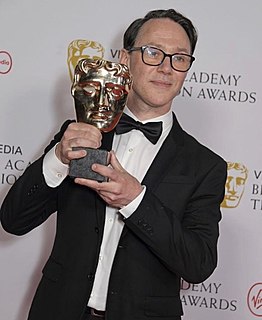A Quote by Richard Bach
A writer, or a beginning writer, is faced by the huge walls of self-consciousness. Most people think, "What if I say the wrong thing? What if I don't sound erudite and sophisticated? I'll be considered a fool." In time, with a lot of practice, you realize that's your foolishness is your gift.
Related Quotes
One of the most useful parts of my education as a writer was the practice of reading a writer straight through - every book the writer published, in chronological order, to see how the writer changed over time, and to see how the writer's idea of his or her project changed over time, and to see all the writer tried and accomplished or failed to accomplish.
I say "on principle" [regarding 'lesbian writer'] because whenever you get one of your minority labels applied, like "Irish Writer," "Canadian Writer," "Woman Writer," "Lesbian Writer" - any of those categories - you always slightly wince because you're afraid that people will think that means you're only going to write about Canada or Ireland, you know.
When one crosses over from an activity, or the verb, of writing or doing, and becomes a noun, like "a writer" I think that is an act of supreme self-consciousness that I've never, in effect, made. I write, but I don't like to think of myself as a writer. I think it's somewhat self-aggrandizing and pretentious. Now, I am a teacher.
Audiences are very sophisticated and they know the nuts and bolts of the genre - certainly with horror more than others I think. But they attract lots of people, they're much derided as a genre but people go and see them and they're not all dumb. There's some very clever horror films. Stephen King gets a lot of flack for not being a proper writer because he's a horror writer, but I think he writes some brilliant books. I think it's wrong to just bin it before looking at it.
Oh, I love labels, as long as they are numerous. I'm an American writer. I'm a Nigerian writer. I'm a Nigerian American writer. I'm an African writer. I'm a Yoruba writer. I'm an African American writer. I'm a writer who's been strongly influenced by European precedents. I'm a writer who feels very close to literary practice in India - which I go to quite often - and to writers over there.
The most durable thing in writing is style, and style is the most valuable investment a writer can make with his time. It pays off slowly, your agent will sneer at it, your publisher will misunderstand it, and it will take people you have never heard of to convince them by slow degrees that the writer who puts his individual mark on the way he writes will always pay off.
There's this message to comedians in particular, that you shouldn't write it, and a television writer should write it. And that's a prevailing conventional wisdom that I think is really wrong. That's not to say that television writers aren't great, but I think that the belief that some comedy writer's going to be able to capture your voice is naive.
Life…we understand it differently at different stages. It’s what is interesting about getting older, you realize your relationship with the past is always negotiable. There is a lot of freedom in that, because you realize you can go back to what you did such a long time ago. You can talk with the dead, talk with your lost self, your disappeared self, and you can visit those places again, and understand it differently. That makes a huge difference.
I write a lot and I will have some originals on the record. I think it is a mistake for an artist like me to think I am a better writer than Cole Porter. I think it is important to realize what my strengths are. I do like to write and I'm not shabby but I don't think I'm the most brilliant writer. I think it would be a shame and sort so egotistical to say I don't need these wonderful writers. These men created works of art and wrote hundreds of beautiful songs. It would be a mistake for me to say at this point in my career that I am so good.
It's not possible to advise a young writer because every young writer is so different. You might say, "Read," but a writer can read too much and be paralyzed. Or, "Don't read, don't think, just write," and the result could be a mountain of drivel. If you're going to be a writer you'll probably take a lot of wrong turns and then one day just end up writing something you have to write, then getting it better and better just because you want it to be better, and even when you get old and think, "There must be something else people do," you won't be able to quit.
Writer-directors are a little bit more liberal, rather than having just the writer on the set, because I think sometimes the writer becomes too precious with the words. If you're a writer-director, you can see what you're doing and see your work in action, so I think you can correct it right there and still not compromise yourself.
The only thing I can say that is not bullshit is that you do have to learn to write in a way that you would learn to play the violin. Everybody seems to think that you should be able to turn on the faucet one day and out will come the novel. I think for most people it's just practice, practice, practice, that sense of just learning your instrument until - when you have an idea on the violin, you don't have to translate it into violin-speak anymore - the language is your own. It's not something you can think your way into, or outsmart. you've just got to do it.






































